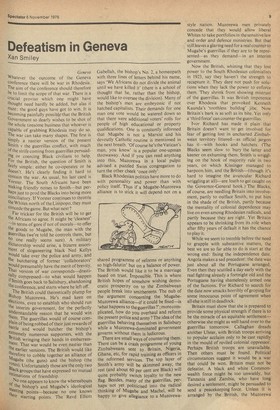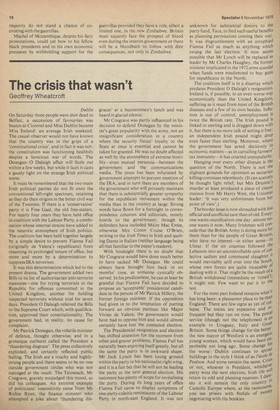Defeatism in Geneva
Xan Smiley
Geneva Whatever the outcome of the Geneva conference there will be war in Rhodesia. The aim of the conference should therefore be to limit the scope of that war. There is a crucial proviso which one might have thought need hardly be added, but alas it must : the good guys have got to win. It is becoming painfully possible that the British Government so dearly wishes to be shot of the whole tiresome business that whoever is capable of grabbing Rhodesia may do so. The war can take many shapes. The first is simply a nastier version of the present Smith v the guerrillas conflict, with much of the strife coming from guerrillas persuading or coercing Black civilians to help. For the British, the question of Smith is fairly simple: either he co-operates or he doesn't. He's clearly finding it hard to contain the war. As usual, his last card is Vorster. The South Africans have been making friendly noises to Smith—but perhaps just to prod the Blacks into being more conciliatory. If Vorster continues to throttle the Whites north of the Limpopo, they must concede the game. But what next ?
Far trickier for the British will be to get the Africans to agree. It might be 'cleanest'
terms of gore if not of morals—to offer the goods to Mugabe, the man with the guerrillas (we're told he controls them, but nt? one really seems sure). A military dictatorship would arise, a bizarre assortment of sloganeering black Ned Kellys would take over the police and army, and the butchering of former 'collaborators' Would presumably have the merit of brevity. That version of war corresponds—drastially compressed—to what would happen if Smith goes back to Salisbury, abandoning the conference, and starts where he left off. The British could theoretically plump for 13Isholo Muzorewa. He's mad keen on elections, even to establish who should run the interim government, for the perfectly Understandable reason that he would win therm The guerrillas would of course cornPlain of being robbed of their just rewards of °auk and would butcher the bishop's e_xtremely numerous supporters, with the British wringing their hands in embarrass em. That war would be even nastier than the earlier versions. The British would like therefore to cobble together an alliance of i'lugabe (the guns) and the bishop (the
Unfortunately those are the only two
ia.ck groups that have expressed no mutual intimations of friendship. No one appears to know the whereabouts ni the bishop's and Mugabe's ideological ee.ting points—because no one knows their starting points. The Revd Elliott
Gabellah, the bishop's No. 2, a homeopath with three lines of letters behind his name, says 'We Africans do not divide the animal until we have killed it' (there is a school of thought that he, rather than the bishop, would like to oversee the division). Many of the bishop's men are embryonic if not hatched capitalists. Their demands for one man one vote would be watered down so that there were additional voters' rolls for people of high educational or property qualifications. One is constantly informed that Mugabe is not a Marxist and his devoutly Catholic routine is mentioned in the next breath. Of course he's the Vatican's man, you know' is a popular one-upman throwaway. And if you can read anything into this, Muzorewa in a local pulpit advised a puzzled Swiss congregation to turn the other cheek 'once only'.
Black Rhodesian politics have more to do with personality and power than with policy itself. Thus if a Mugabe-Muzorewa alliance is to stick it will depend not on a
shared programme of reforms or anything so high-falutin' but on a balance of power. The British would like it to be a marriage based on trust. Impossible. This is where British hopes of somehow wishing democratic prosperity on to the Zimbabwean people break into smithereens. The nub of the argument concerning the MugabeMuzorewa alliance—if it could be fixed—is 'what happens to the guerrillas ?' ; more complicated, how do you overhaul and reform the present police and army ? The idea of the guerrillas behaving themselves in Salisbury while a Muzorewa-dominated government governs without them is ludicrous.
There are small ways of countering them. There can be a crash programme of young Zimbabweans sent to Britain, Nigeria, Ghana, etc, for rapid training as officers in the reformed services. The top layer of Smith's army will
be skimmed away, the rest (and about 60 per cent are Black) will quite probably switch loyalty to the new flag. Besides, many of the guerrillas, perhaps not yet politicised into the radical thinking of Mugabe and Machel, will be happy to give allegiance to a Muzorewa
style nation. Muzorewa men privately concede that they would allow liberal Whites to take portfolios in the sensitive law and order and defence ministries. But that still leaves a glaring need for a real counter to Mugabe's guerrillas if they are to be represented—as they demand—in an interim government.
Now the British, whining that they lost power to the South Rhodesian colonialists in 1923, say they haven't the strength to recapture it. They dare not push for solutions when they lack the power to enforce them. They shrink from showing mistrust of the guerrillas. It was British impotence over Rhodesia that provoked Kenneth Kaunda's 'toothless bulldog' jibe. Now Britain's bark is as soft as its bite. Yet only a 'third force' can counter the guerrillas.
Ivor Richard has made it plain that Britain doesn't want to get involved for fear of getting lost in uncharted Zimbabwean territory littered—as official jargon has it—with hooks and hatchets. (The Blacks seem slow to bury the latter and keener on exhuming them, Smith is wriggling on the hook of majority rule in two years, on which Kissinger managed to harpoon him, and the British—(though it's hard to imagine the avuncular Richard wriggling at alp—are loath to get caught on the Governor-General hook.) The Blacks, of course, are needling Britain into involvement, partly to outface Smith, to put him in the shade of the British, partly because the mentality of colonial dependence may live on even among Rhodesian radicals, and partly because they are right. Yet Britain appears to be shrinking from its role when after fifty years of default it has the chance to play it.
While we seem to tremble before the need to grapple with substantive matters, the best we are so far able to do is start at the wrong end: fixing the independence date. Angola makes a sad precedent : the date was just about all the Portuguese arranged. Even then they scuttled a day early with the real fighting already a fortnight old and the Portuguese having shamelessly armed one of the factions. For Richard to search for the date now smacks horribly of groping for some innocuous point of agreement when all else is still in deadlock.
Britain must show that she is prepared to provide some physical strength if there is to be the miracle of an equitable settlement— otherwise she might as well hand over to the guerrillas tomorrow. Callaghan dreads another Ulster, with British troops arriving to popular acclaim only to be cast rapidly in the mould of reviled colonial oppressor. Perhaps British troops are unavailable. Then others must be found. Political circumstances suggest it would be a war that could be won. Britain must not be defeatist. A black and white Commonwealth force might be too unwieldy, but Tanzania and Zambia, who have long desired a settlement, might be persuaded to send a peacekeeping force. Unless it is arranged by the British, the Muzorewa
majority do not stand a chance of coexisting with the guerrillas.
Machel of Mozambique, despite his fiery protestations, could yet bow to his fellow black presidents and to his own economic pressures by withholding support for the guerrillas provided they have a role, albeit a limited one, in the new Zimbabwe. Britain must squarely face the prospect of blood even during the interim government or there will be a bloodbath to follow with dire consequences, not only in Zimbabwe.



















































 Previous page
Previous page